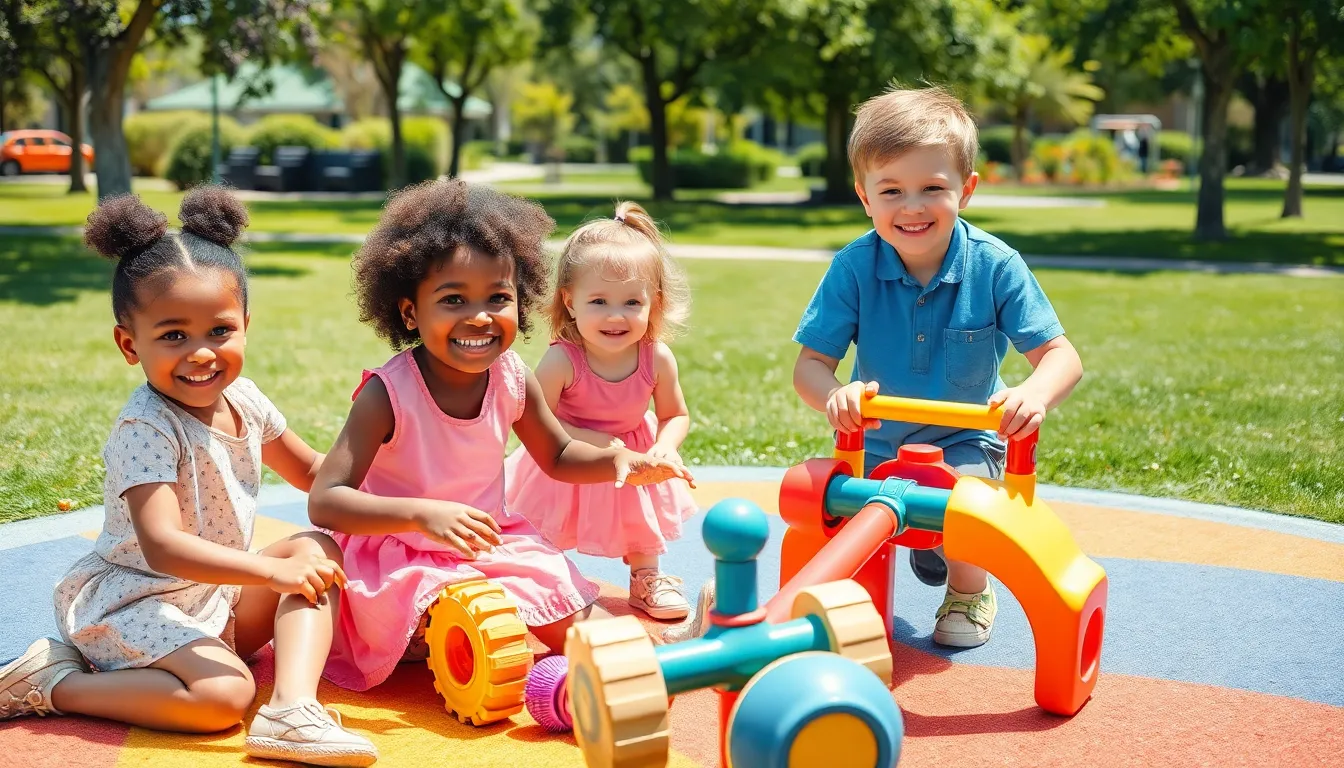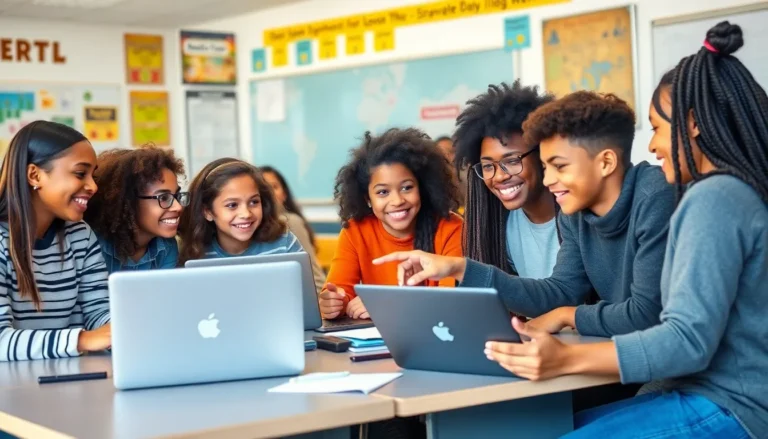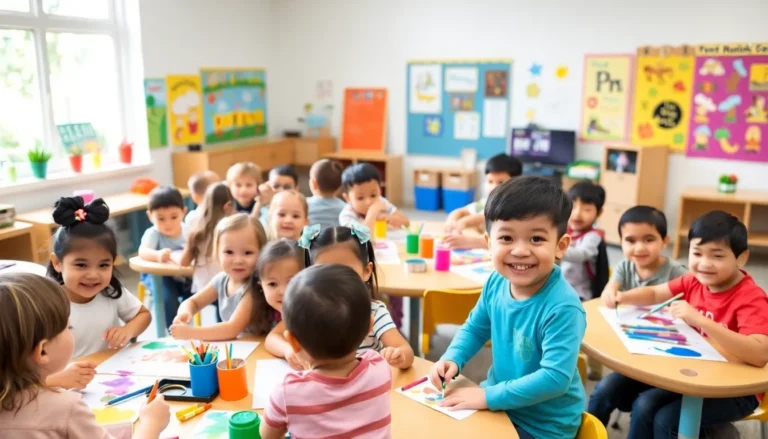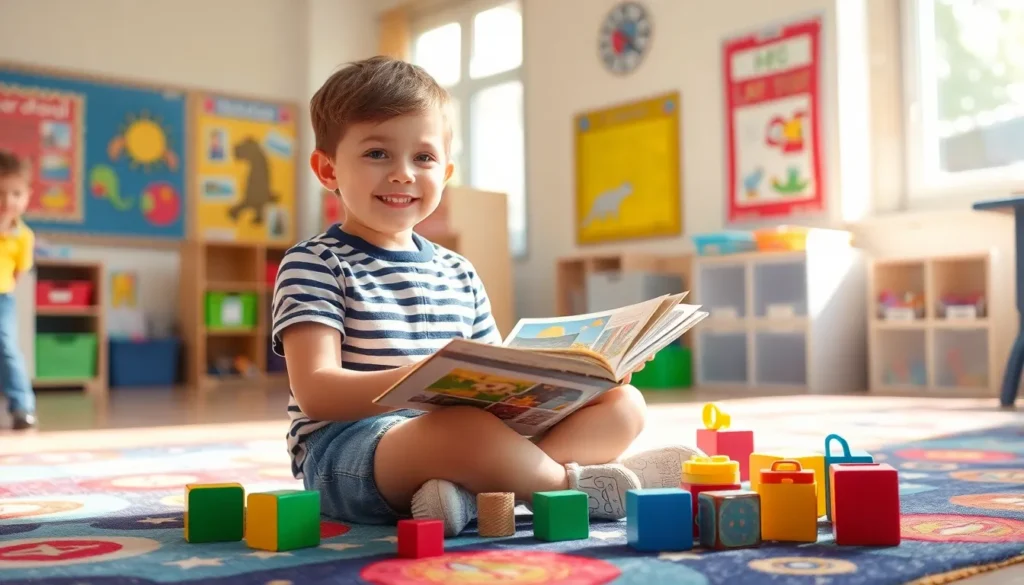Table of Contents
ToggleAs the countdown to kindergarten begins, parents often find themselves in a whirlwind of excitement and anxiety. Will their little one be ready to tackle the alphabet? Can they navigate the social jungle of snack time and sharing? Kindergarten readiness isn’t just about knowing how to spell “cat”; it’s about laying the foundation for a lifetime of learning and growth.
Understanding Kindergarten Readiness
Kindergarten readiness encompasses essential skills children need for a successful transition to school. This readiness includes academic, social, and emotional components.
Definition of Kindergarten Readiness
Kindergarten readiness refers to a child’s preparedness for the academic and social environment of school. It includes recognizing letters, numbers, and shapes, along with essential skills like sharing and following directions. Emotional maturity plays a crucial role, allowing children to manage feelings and interact positively with peers. Schools often assess readiness across multiple areas to ensure a well-rounded evaluation.
Importance of Kindergarten Readiness
Kindergarten readiness significantly impacts children’s long-term academic success. Research shows that children who start school prepared tend to perform better in subsequent grades. Social skills, such as cooperation and empathy, foster positive relationships with classmates and teachers. Emotional readiness allows children to adapt to new environments, crucial for reducing anxiety. Prioritizing readiness helps establish a strong foundation for lifelong learning and growth.
Key Components of Kindergarten Readiness

Kindergarten readiness encompasses several vital components that contribute significantly to a child’s success in school. Fostering these aspects helps build a strong foundation for lifelong learning.
Social Development
Social development plays a crucial role in kindergarten readiness. Children learn to interact with peers, share toys, and engage in cooperative play. Interacting effectively with others fosters communication skills and helps build friendships. Kids who can express themselves clearly tend to adapt more easily in group settings. Learning how to take turns also enhances their ability to navigate social situations. Effective problem-solving among peers is essential, particularly in conflict resolution scenarios, as it prepares them for collaborative activities in school.
Emotional Readiness
Emotional readiness significantly impacts a child’s transition to kindergarten. Understanding and managing emotions allows children to handle challenges and express feelings appropriately. Kids who can recognize their emotions tend to develop healthier relationships. Through emotional maturity, children adapt to the school environment with reduced anxiety. They learn to seek help when needed and support classmates in distress. Developing resilience empowers children to face new situations confidently, contributing to their overall success in school.
Cognitive Skills
Cognitive skills provide the academic groundwork for kindergarten readiness. Recognizing letters, numbers, and shapes helps children make connections within learning environments. Encouraging curiosity promotes exploration and critical thinking. Skills like counting, identifying patterns, and following multi-step directions lay the groundwork for math and literacy. Engaging in activities that require focus enhances concentration and attention spans. Children with well-developed cognitive skills are better prepared for classroom learning and instruction.
Physical Development
Physical development forms a foundational aspect of kindergarten readiness. Children develop gross motor skills through activities like running, jumping, and climbing. Fine motor skills, gained from tasks like drawing and using scissors, improve hand-eye coordination essential for writing. Participating in active play with peers encourages teamwork and fosters physical fitness. Engaging in regular physical activity also promotes overall health, contributing positively to children’s emotional and cognitive development. When children possess strong physical skills, they feel more confident navigating their school environment.
Assessing Kindergarten Readiness
Assessing a child’s readiness for kindergarten involves various tools and methods that measure essential skills. Understanding these tools helps parents and educators identify areas where a child excels or may need support.
Tools for Assessment
Observation plays a critical role in assessing children’s readiness. Caregivers can observe how children interact with peers during play, noting their ability to share, take turns, and resolve conflicts. In addition, standardized assessments, such as the Ages & Stages Questionnaires (ASQ) and the Developmental Indicators for the Assessment of Learning (DIAL), offer structured ways to evaluate children’s cognitive, social, and emotional skills. Portfolios that document children’s work samples provide valuable insights into their progress and development. These tools, when used collectively, create a comprehensive picture of a child’s readiness for the classroom environment.
Recommended Age for Assessment
Evaluating kindergarten readiness typically starts at age four. By this age, most children show significant growth in key areas such as social skills, language development, and emotional regulation. Experts recommend conducting assessments one year before kindergarten entry, as this timing allows families to address any identified gaps in readiness. Continuous observation and informal assessments during this year can refine understanding and support children’s growth. As a result, children enter kindergarten equipped with the skills needed to thrive academically and socially.
Strategies to Enhance Kindergarten Readiness
Implementing effective strategies can significantly boost a child’s readiness for kindergarten. Focus on key areas such as parental involvement, early learning activities, and community resources.
Parental Involvement
Active participation by parents plays a critical role in children’s readiness. Engaging in daily routines helps children develop social skills while fostering emotional security. Parents can encourage learning by reading together, discussing daily activities, or visiting educational places. Regularly communicating with teachers can also provide valuable insights into their child’s progress. Attending school events and parent workshops builds stronger connections with the school community. Involvement in children’s learning experiences creates a foundation for academic success.
Early Learning Activities
Incorporating early learning activities can enhance cognitive and social skills. Simple activities like counting objects, identifying shapes, or practicing letters stimulate curiosity and promote problem-solving. Encourage imaginative play through games and role-playing, fostering creativity and social interactions. Art projects enhance fine motor skills and self-expression. Set aside time for outdoor play, which supports physical development and cooperation. Structured routines and engaging activities nurture a love for learning while preparing children for the kindergarten environment.
Community Resources
Utilizing community resources offers additional support for kindergarten readiness. Libraries often host storytime sessions, promoting literacy and love for books. Local playgroups provide opportunities for socialization, allowing children to practice sharing and teamwork. Enrollment in early childhood programs can enhance academic and emotional skills. Many communities offer workshops for parents, providing strategies to support children’s learning effectively. Utilizing available resources strengthens children’s readiness, setting the stage for successful educational experiences.
Kindergarten readiness is a multifaceted concept that encompasses social emotional cognitive and physical development. By focusing on these areas parents can help their children build a solid foundation for future academic success. Engaging in early learning activities and fostering a supportive environment plays a crucial role in easing the transition to school.
As children develop these essential skills they not only prepare for the challenges of kindergarten but also set the stage for lifelong learning and positive relationships. With the right support and resources parents can ensure their children are ready to thrive in the classroom and beyond.







